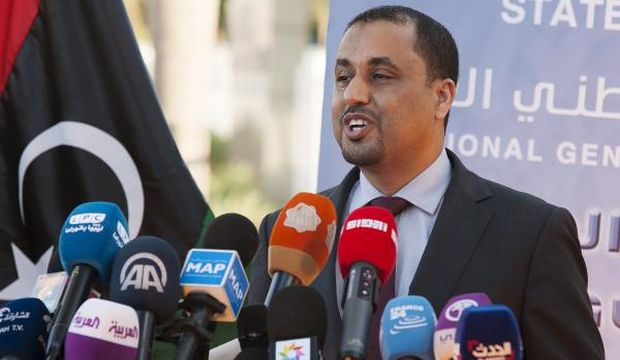
Saleh Al-Makzom, deputy president of Libya’s General National Congress (GNC), speaks during UN-brokered talks in Skhirat, near Rabat, Morocco, on June 25, 2015. (Reuters/Stringer)
Rabat and Cairo, Asharq Al-Awsat—Libya’s rival parliaments on Sunday met for the first time for talks on a UN-sponsored proposal which would see them sharing power in the war-torn country.
Libya currently has two parliaments, the General National Congress (GNC) in Tripoli and the internationally recognized House of Representatives in the eastern city of Tobruk. Each side has appointed its own government and is also backed by an armed faction.
On Monday the delegations returned from the Moroccan coastal resort city of Skhirat where talks are being held to Libya for consultations, without endorsing the UN proposal. Special UN Envoy Bernardino León envisages a deal could be reached by July 2 when talks resume.
The proposal would see a ceasefire declared and the formation of a one-year government of “national accord” headed by a prime minister and two deputies with executive powers. The House of Representatives would act as the legislative body in the country, but a 120-member State Council would also be formed, composed of 90 members from the rival GNC.
The disarmament of armed groups and their withdrawal from oil facilities—once a lucrative source of income for Libya—are also included in the proposal.
Before the talks started, both sides had agreed in principle to the draft of the proposal submitted by León. However, a number of issues remain as sticking points, mostly related to the powers of the State Council and the country’s national army.
According to the AFP news agency, on Monday the GNC delegation said the UN had made a number of changes to the proposal without consulting with the GNC’s delegation beforehand.
“Three key points of the UN draft agreement had been modified without our consultation,” GNC delegation spokesman Ashoh Ashraf told reporters on Monday.
León has expressed optimism that a deal will be reached by July 2, saying on Saturday he was “convinced that we will achieve a just solution.” Other reports have suggested an agreement between both sides is close.
However, Faraj Bouhashem, official spokesman for the Tobruk government, on Sunday denied the reports. He told Asharq Al-Awsat any agreement reached would only be announced in an official capacity by the Tobruk government.
The current power struggle between both sides began last August when the newly elected House of Representatives was forced out of Tripoli after a loose collection of militant groups known as Libyan Dawn took over the capital and reinstated the Islamist-dominated GNC.
Members of the House of Representatives and its allied government fled to Tobruk where they then set up a rival power base.
While Libyan Dawn supports the GNC in Tripoli, the Libyan National Army—consisting of remnants of former leader Muammar Gaddafi’s army including the air force—is now allied to Tobruk. Fierce battles have raged between both across the country.
Fighting between the Libyan National Army and Libyan Dawn as well as the presence of militant and extremist groups such as the Islamic State of Iraq and Syria (ISIS) has plunged Libya into anarchy, with its once-thriving oil industry left decimated.
Human trafficking has also thrived in the country in the midst of the chaos, with the recent Mediterranean migrant deaths off the coast of Italy largely blamed on traffickers from the war-torn North African country.
